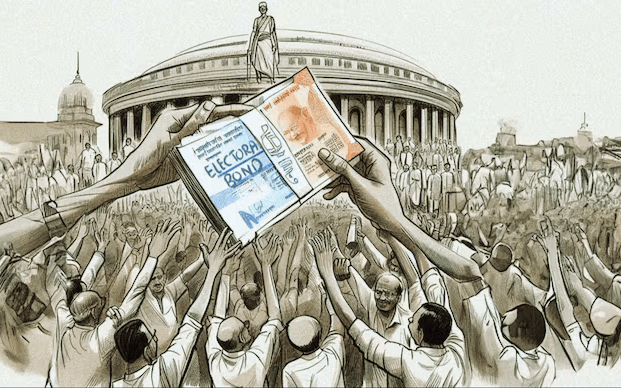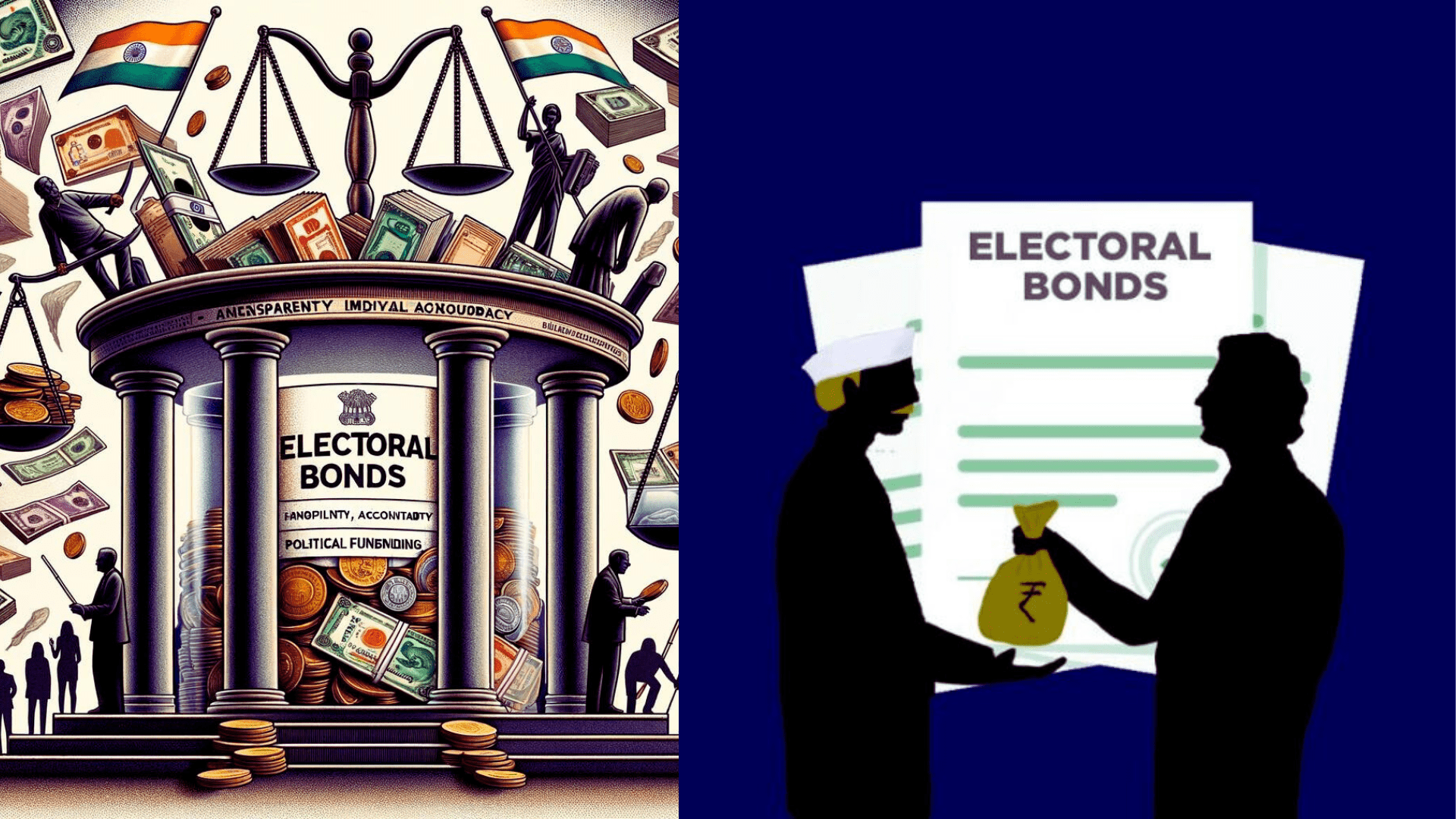Electoral bonds are a type of financial instrument introduced in India in 2017 as a method for funding political parties. These bonds allow individuals and corporations to anonymously donate to political parties. Electoral bonds can be purchased from specific branches of the State Bank of India (SBI) during designated periods and are available in fixed denominations. The donors buy these bonds and give them to their preferred political party, which can then redeem them through designated bank accounts. This system was designed to enhance transparency by keeping the funding through banking channels, although it has been criticized for allowing donor anonymity, which could undermine the transparency of political donations.
What Are Electoral Bonds?

Electoral Bonds were a financial mechanism introduced in India in 2017 specifically for funding political parties. These are bearer instruments, much like a promissory note, that any individual or corporation can purchase from designated branches of the State Bank of India. The bonds were issued in fixed denominations and allowed donors to contribute funds anonymously to political parties. Parties could then cash these bonds through their verified bank accounts. The system was designed to ensure contributions were banked and reported, but it was criticized for preserving donor anonymity, potentially compromising transparency in political financing. Ultimately, electoral bonds were struck down as unconstitutional by the Indian judiciary due to concerns over their impact on transparency and democratic accountability.
Historical Background
Electoral bonds were introduced in India in 2017 by the Bharatiya Janata Party (BJP) led government. The concept was first announced by the then Finance Minister, Arun Jaitley, as part of the 2017 Union Budget. These bonds were intended as a new mechanism for funding political parties, designed to ensure that all political donations were channeled through banking systems, ostensibly to bring transparency to political funding. Despite this, the scheme was criticized for allowing donors to remain anonymous, which raised concerns about the potential for unchecked and undisclosed corporate influence on politics.
The Supreme Court of India, after various legal challenges, struck down the electoral bonds scheme in February 2024, almost seven years after its inception, concluding that it undermined transparency and accountability in political finance, thus impacting democratic governance adversely.
How Do Electoral Bonds Work?
Purchase
These bonds can be purchased during specific windows opened by the State Bank of India (SBI), the only authorized bank to issue them. Buyers can purchase these bonds in multiple denominations and hand them over to the political party of their choice, which can then be redeemed through the party’s verified bank account.
The bonds were designed to ensure that all donations passed through the banking system, purportedly increasing transparency. However, the anonymity provided to donors has been a subject of controversy.
Redemption
Electoral bonds, once purchased by donors, can be donated to a political party of the donor’s choice. The process for the redemption of these bonds by the political parties involves depositing them into an authorized bank account of the party.
Key Features of Electoral Bonds
Electoral bonds were financial instruments used in India for anonymous political donations from 2017 until they were declared unconstitutional. Key features included:
- Anonymity: Donors could anonymously contribute to political parties, which was intended to protect donor identities and potentially reduce coercion or influence.
- Banking Channel: These bonds were exclusively handled by the State Bank of India, ensuring that all transactions were processed through a formal banking system.
- Unlimited Donations: There was no cap on the amount of money that could be donated via electoral bonds, allowing individuals and corporations to contribute without any upper limit.
- Specific Usage: The bonds could only be used by the receiving political parties to fund their activities, aiming to streamline and clean up political funding.
The Parties Involved
Government

The parties involved in the governance and regulation of electoral bonds in India included:
- The Government of India: Introduced the scheme as a method to fund political parties through anonymous bonds.
- The Supreme Court of India: Played a critical role by eventually ruling that the scheme was unconstitutional, leading to its termination.
- The State Bank of India (SBI): Exclusively authorized to issue and manage the transactions of electoral bonds, as detailed in the released data following a Supreme Court directive.
- The Election Commission of India: Involved in overseeing the transparency and legality of electoral financing, including the public release of information concerning electoral bonds.
Banks
The key banking institutions involved with electoral bonds in India were:
- State Bank of India (SBI): This was the sole authorized bank where electoral bonds could be purchased by individuals and organizations intending to donate to political parties. The SBI played a crucial role in the issuance and management of these bonds.
- Reserve Bank of India (RBI): The central bank had significant concerns about the electoral bonds scheme, particularly regarding the autonomy of monetary policy and the potential for misuse of the scheme. The RBI‘s reservations highlight the financial and regulatory challenges posed by the bonds.
Political Parties
Electoral bonds in India were a significant funding tool for political parties, offering a mechanism for receiving financial support anonymously from corporate and private entities. The primary parties involved with electoral bonds include:
- The Bharatiya Janata Party (BJP), which was a major beneficiary of this funding model, using the system to enhance its financial capabilities, especially before elections.
- Other political parties also utilized this system, though specific names and the extent of their involvement vary, the system was broadly applied across the political spectrum to secure funds under the anonymity provision that electoral bonds allowed.
The Supreme Court of India ultimately deemed the electoral bond system unconstitutional, citing concerns over transparency and potential misuse of political funding.
Benefits of Electoral Bonds
Electoral bonds brought several benefits to the political funding landscape in India:
- Increased Transparency: By channeling political donations through the banking system, electoral bonds reduced the reliance on cash transactions, which are harder to track and regulate. This system was intended to make the source of funds clearer and more traceable, at least at the banking level.
- Donor Anonymity: Electoral bonds provided a level of anonymity to donors, allowing them to support political parties without the fear of retribution or negative repercussions. This was seen as a way to encourage more individuals and entities to contribute to the political process.
- Reduction in Black Money: By facilitating donations through official and traceable channels, electoral bonds aimed to curb the inflow of unaccounted money into the political system, potentially leading to cleaner political funding.
- Tax Benefits: Donors issuing electoral bonds could avail themselves of tax exemptions under specific sections of the Income Tax Act, which also incentivized legal and recorded contributions over undocumented cash dealings.
Criticisms and Concerns
Transparency Issues
The implementation of electoral bonds in India has faced significant criticisms regarding transparency:
- Anonymity vs. Transparency: While electoral bonds were introduced as a tool to enhance transparency by channeling donations through banks, they also allow for donor anonymity. This has raised concerns about potential misuse, where donors could influence political parties without public disclosure.
- Lack of Public Disclosure: Critics argue that the anonymity provision prevents the public from knowing who funds political parties. This lack of transparency can lead to suspicions of quid pro quo and undue influence on policy-making.
- Concerns from Institutional Bodies: Institutions like the Election Commission and the Reserve Bank of India have expressed concerns about the potential for misuse of electoral bonds, particularly regarding the anonymity feature, which might undermine the democratic process.
- Judicial Scrutiny: The scheme’s transparency concerns have been significant enough to prompt judicial review, with the Supreme Court referring challenges to the scheme to a larger bench for a more thorough examination.
Potential for Misuse
The electoral bonds scheme in India has raised several concerns about potential misuse:
- Risk of Money Laundering: The anonymity feature of electoral bonds allows donors, including corporations, to contribute to political parties without disclosure. This could potentially be exploited for money laundering, as it obscures the source of political funding.
- Undue Influence on Policy: There is concern that companies, especially those newly formed or financially unsteady, are donating large sums which might be in anticipation or return of favors in the form of contracts or policies beneficial to them.
- Concerns from Financial and Judicial Institutions: Both the Reserve Bank of India and the Supreme Court have raised alarms about the potential misuse of electoral bonds. The RBI has specifically warned that these bonds could be misused by unscrupulous entities to funnel black money into the political system.
- Legal Scrutiny: The Supreme Court is currently reviewing the constitutional validity of the electoral bonds scheme, highlighting the gravity of the concerns regarding its potential for misuse.
Electoral Bonds in Different Countries
The concept of electoral bonds, specifically as implemented in India, appears to be unique and not currently replicated in the same format in other countries. The Indian electoral bonds scheme was introduced in 2018 as a method for funding political parties while maintaining donor anonymity. This scheme allows corporations and individuals to buy bonds from authorized banks and donate them anonymously to the political parties of their choice.
Critiques argue that while this system intends to clean up the sources of political funding by digitizing the process and keeping identities confidential, it also raises significant transparency issues and the potential for misuse. Concerns include the possibility of political influence by anonymous donors and lack of public oversight on the origin of political donations.
Although other countries employ various mechanisms for political financing, such as public funding, regulated private donations, and strict reporting and disclosure norms, the specific model of electoral bonds as seen in India does not appear to be in practice elsewhere.
The Future of Electoral Bonds
Proposed Changes
Recent developments suggest significant changes are underway concerning India’s electoral bonds. The Supreme Court of India has recently scrapped this funding system, which permitted individuals and companies to donate unlimited amounts anonymously to political parties. This decision marks a crucial shift, potentially affecting how political funding will be structured in the future.
In response, the finance ministry is already considering a new scheme to replace the electoral bonds system. Although specific details of the new system are still under wraps, it is expected to emerge following national consultations, suggesting a move towards a more transparent or regulated political funding mechanism.
Conclusion
Electoral bonds represent a unique approach to reforming political finance. While they offer a potential path towards cleaner political funding, they also pose significant challenges and stir debate. As with any policy, the key lies in balancing transparency with practicality to ensure that the system strengthens democracy.
Read also: What is a Ballistic Missile?




